|
MISSION STATEMENT
Violence is the main obstacle to human development. There is an intrinsic link between violence and religion, patriarchal gender violence being the most pervasive expression of religious violence. Mitigating violence therefore requires overcoming the patriarchal mindset, especially in religious institutions. The mission of this independent newsletter is to provide a commented digest on current research and emerging issues related to human solidarity, ecological sustainability, and both religious and secular non-violence. The U.N. "Millennium Development Goals" (MDGs) are used as a point of reference.
Theme of this Issue
IF NOT THE MDGs, THEN WHAT?
|
SUMMARY
The theme of this issue is, "If Not the MDGs, Then What?" The conclusion is reached that there is no other comparable program, either operational or in the planning stage. There is no other program that is truly global and has the participation (at least in principle) of 190+ nations. There is no other program that seeks a balance between human development and conservation of the human habitat. There is no other program that seeks a balance between egalization and globalization. Nor is there any other program that shows the need for some form of global governance; not that this is going to happen anytime soon.
Needless to say, for the MDGs to be unique is of no value unless they become an instrument of both social and environmental justice at the global level. Are they adding value to the quality of life of every human person alive today? Are they decreasing the probability of climate change and other environmental issues becoming uncontrollable natural disasters? It is not merely a matter of reaching certain numerical targets, even though measurable benefits wouldn't hurt. What really matters is the transition from homo economicus to homo solidarius; the transition to a new mindset that seeks a balance between individual interest and the common good. One manifestation of such transition would be a reversal of the widening gap between the rich and the poor at all levels: local, national, regional, global.
If this is what really matters, the jury is still out for the MDGs. But, lacking alternatives, it would seem wise for individuals and nations to stop messing around and get ready to face the music: the MDGs will be successful because we must make them successful in achieving the transition from extravagant consumption and power addiction to sustainable development in a non-violent world. Else, the future of humanity may become the non-future of humanity.
This brings to mind the need for a better understanding of global sustainable development projects such as the MDGs. A section is provided with a brief (and by no means comprehensive) survey of research activities directly related to the MDGs. A few research programs are also listed which, while not directly related to the MDGs, contribute new knowledge about specific issues that are relevant and/or pertain to best practices in managing such global projects.
As usual, this issue provides the monthly research report on the left (white) column, and a number of announcements and information of interest in the right (green) column. Feedback to the editor would be gratefully received regarding both. Let us continue to pray and work for the MDGs. For those of us who believe in a God that loves humanity, there is never reason for despair.
Updating of the SSNV-MDG knowledge taxonomy and links database continues as time permits. The current version shows the links sorted by mega-disciplines, and within each mega-discipline by MDGs. This is "work in progress" but you are cordially invited to take a look at this resource and download it (free) for your own use (two options: HTML Web Page
or EXCEL Spreadsheet).
The invited paper this month is
Eco-Humanism and Popular System Dynamics as Preconditions for Sustainable Development,
by Leslaw Michnowski.
| |
1. Global News & Emerging Issues
The following is a selection of recent news related to solidarity, sustainability, and non-violence, specifically in the context of the U.N. Millennium Development Goals (MDGs) and related global issues. Only the topics are listed, and sometimes abbreviated. Simply hover your mouse inside the box to stop the scrolling, and click on any title to navigate to the news source, where both the complete citation and the complete text are provided.
|
| |
|
Editor's Note: For more news sources, visit the SSNV News Sources and RSS Feeds Page
Editor's Comment: The brutal assassination attempt on Benazir Bhutto (Pakistan, 20 October 2007) is a sad example of the main reason why achieving the 2015 MDG targets is in jeopardy. "I do not wish to seem overdramatic, but I can only conclude from the information that is available to me as Secretary-General, that the Members of the United Nations have perhaps ten years left in which to subordinate their ancient quarrels and launch a global partnership to curb the arms race, to defuse the population explosion, and to supply the required momentum to development efforts. If such a global partnership is not forged within the next decade, then I very much fear that the problems I have mentioned will have reached such staggering proportions that they will be beyond our capacity to control." U Thant, 1969. Perhaps U Thant was right. Let's face it, we may already be in a complex global crisis that is beyond our control. And yet, for those of us who believe in a God that loves humanity, hope prevails.
|
2. Negative Assessments of the MDGs
A number of negative assessments have been published. These concerns and critical assessments are not necessarily mean-spirited. On the contrary, some of the MDG critics are people who are totally committed to work for a world of peace, justice, and sustainable development. A good example is Patrick Bond, an Irishman scholar who is spending his life working for the sustainable development of Africa, and who has contributed two invited papers to this newsletter. According to Bond:
|
"What should be the foundational campaigning demands for those attempting to eradicate Third World poverty? The Millennium Development Goals are popular, serving in 2005 to motivate the British Make Poverty History movement, the Live8 consciousness raising rock concerts and the Johannesburg-based Global Call to Action Against Poverty. Yet, upon closer inspection, the implementation processes associated with the MDGs have serious weaknesses. They were generated non-transparently by the United Nations, itself moving since the early 2000s to embrace the Washington Consensus and co-operate with the World Bank, to ‘bluewash’ the world’s largest corporations with its Global Compact, to endorse ‘Type 2’ public – private partnership privatisation strategies, to condone US militarism, and to reject even elementary democratic reform. The main decisions at the Monterrey and Doha finance and trade summits were biased against poor people, workers, women and the environment. Aspirational targets like the MDGs are, in any case, far less important than the actual social struggles underway across the world for basic needs and democracy. As shown in the 2005 campaigns, work on MDGs distracts us from solidarity with the real agents of progressive social and environmental history, in progressive civil society." Vol. 3 No. 5 (May 2007). Bond refers to these as "perils of elite pacting" Vol. 3 No. 6 (June 2007).
|
In a 2005 paper, What’s Wrong with the Millennium Development Goals?, Michael Clemens and Todd Moss of the Center for Global Development offer the following assessment:
|
"Many poor countries, especially those in Africa, will miss the MDGs by a large margin. But neither African inaction nor a lack of aid will necessarily be the reason. Instead, responsibility for near-certain ‘failure’ lies with the overly-ambitious goals themselves and unrealistic expectations placed on aid. While the MDGs may have galvanized activists and encouraged bigger aid budgets, over-reaching brings risks as well. Promising too much leads to disillusionment and can erode the constituency for long-term engagement with the developing world."
|
Other critics (in varying degrees) of the MDGs include R. E. Turner and Timothy E. Wirth, members of the Board of Directors of the United Nations Foundation, the Communication for Social Change Consortium, Diana Bronson and others of Rights & Democracy, Robert Archer of the International Council on Human Rights Policy (Switzerland), Roger Williamson of Wintol Park (UK), Oxfam International, Inge Kaul, and others.
Concerns about the MDGs generally include the following:
- They were defined within the United Nations with minimum consultation with the Third World
- The implementation process is driven by the World Bank and the IMF bureaucracies
- The implementation process is under the influence of global corporations
- The implementation process seldom includes verification of benefit delivery to the poor
- The implementation process lacks methods to ensure achievability and accountability
- They are too narrow, should be more comprehensive (to allow some implementation flexibility)
- They are too general, should be more specific (especially in terms of targets and indicators)
- They assume that the developed nations can dictate what to do to developing nations
- They assume that what is good for the developed nations is good for the developing nations
- They assume that technologies that work in industrialized nations can be used everywhere
- They ignore human rights abuses as something that is irrelevant to sustainable development
- They tolerate too much corruption in the governments of the developing nations
- They tend to disregard the impact of military actions, arms sales, and other symptoms of violence
- They focus on "giving" to the poor rather than "enabling" the poor to overcome poverty
- They focus on economic development at the expense of human development
These are legitimate concerns, expressed by people and institutions with credibility. Given that nothing human is 100% pure, some weaknesses and failures are to be expected. It is also wise to keep in mind, that the MDGs are not meant to displace or inhibit other initiatives pursuant to eradicating extreme poverty, promoting gender equality, taking good care of the human habitat, etc. It is also noteworthy, that the United Nations does not have a political mandate, let alone the resources, to take action regarding any of the concerns listed above. It must rely on persuasion and diplomacy. The nation-states cannot possibly resolve issues that are intrinsically global, but the world is not yet ready for global governance.
3. Positive Assessments of the MDGs
If some of the negative assessments of the MDGs seem to ignore human and political realities, the same happens with positive (and sometimes naively optimistic) assessments about achieving the MDGs. Some brief statements should suffice:
|
"The MDGs provide a framework for the entire UN system to work coherently together towards a common end. The UN Development Group (UNDG) will help ensure that the MDGs remain at the centre of those efforts. On the ground in virtually every developing country, the UN is uniquely positioned to advocate for change, connect countries to knowledge and resources, and help coordinate broader efforts at the country level." Implementing the Millennium Declaration (UN)
"The Millennium Development Goals aim to reduce poverty and hunger, ensure all children have access to school, reverse the spread
of diseases like HIV/AIDS and malaria, preserve the environment and empower women. The eighth goal addresses the two-way
partnership between rich and poor countries, without which these goals could not be achieved. Establishing the goals is one thing, achieving them another. With less then a decade to go before 2015, poor nations are expected to step up their development activities and to institute policies conducive to making progress on the goals. Wealthy countries need to step up their commitment of resources to poor countries as well. To make progress on the goals, the World Bank estimates that development assistance to poor countries should double from what contribution levels have been in recent years. This could add up to $40-$70 billion dollars. As one of the 189 countries that signed on to the Millennium Development Goals, the U.S. has committed to implementing policies that help poor countries meet the goals, including areas of trade justice, debt cancellation, and development aid." Achieving the Millennium Development Goals (USCCB)
"A UN report [the MDG 2007 Report] was released today on the world's progress toward the Millennium Development Goals. The report highlighted considerable gains: of note is an increase in enrollment in primary education from 80% in 1991 to 88% in 2005, with much of that progress made since 1999. However, the report notes that the number of people dying from AIDS is still on the rise, at a staggering 2.9 million people worldwide in 2006. Says UN Secretary-General Ban Ki-Moon, "The world wants no new promises. It is imperative that all stakeholders meet, in their entirety, the commitments already made in the Millennium Declaration...The MDGs are still achievable if we act now." Half-way There and Time to Pick up the Pace
"Lorik Cana, the famous Kosovar football player has accepted the invitation of UNDP Kosovo to become the promoter of the Millennium Development Goals. He will hold the “MDG Champion” title and will advocate on their importance. In a big media ceremony that concluded a very successful year for UNDP Kosovo, UNDP Resident Representative, Frode Mauring awarded Lorik Cana with the “MDG Champion” certificate. In his speech Mr. Mauring said that UNDP together with other UN Agencies are committed towards fulfilling the MDGs but in order to achieve the goals dedication and cooperation of Kosovars is needed. Lorik Cana, on the other hand, said that that he is proud that UNDP entrusted him to be representative and promoter of MDGs in Kosovo. “I will do my best to use all my capacities and knowledge to contribute towards achieving these goals on behalf of people of Kosovo”, said Cana . Participants at the event were able to watch a video spot that was exclusively prepared for the MDG campaign featuring Lorik Cana. This spot will be broadcast in all three national TV stations in Kosovo. After the ceremony, Lorik Cana together with Frode Mauring , visited SOS Kinderdorf children’s village where a number of children who are abandoned, social cases of with special needs, live." Lorik Cana – Champion of the Millennium Development Goals (UNDP Kosovo)
"Now let me do a bit of arithmetic with you. The rich countries have a combined GNP of $25 trillion this year. They’ve repeatedly said that they should take concrete steps towards the international target of 0.7% for donor assistance, which would be $175 billion a year. Compare that with the current rate of $50 billion a year. There is a gap of $125 billion between promise and delivery. $125 billion a year! In the work of the Commission on Macroeconomics and Health, we found that $25 billion was needed to deliver basic life-saving health services for the low income countries. In other words, just one-fifth of the gap. If you do the arithmetic, it is $25 billion out of
$25 trillion. That’s one-thousandth of the rich world’s GNP! Just 10 cents out of every $100 of rich countries’ GNP." Jeffrey Sachs, Director, Earth Institute, Columbia University
|
Reasons for enthusiasm about the MDGs generally include the following:
- The MDGs is the only program that has been endorsed for all members of the United Nations
- Achieving the MDGs is primarily a matter of financial aid, and the developed nations have the money
- The required political will materialize as more influential people recognize the need to act (Al Gore)
- There will be technological breakthroughs that will resolve environmental issues such as global warming
- The MDGs are one more step toward all nations recognizing the need for global governance
- The MDGs can do what charities and other individual initiatives cannot do: create worldwide momentum
- If the MDGs are achieved and sustained, the likelihood of more wars and terrorism decreases significantly
- The brain drain from developing to developed nations can be reversed if the MDGs are achieved
- Both emigration and immigration problems will vanish as people can earn a living in their own countries
- The PRSPs serve to expose dubious financial manipulations by the World Bank and the IMF
- The PRSPs also serve to expose cases of government corruption in the developing nations
- The MDGs will serve to temper the greed of large corporations engaged in international trade
- The negatives of globalization will be neutralized when all nations are engaged in sustainable development
- The MDGs will make it evident to people everywhere that democracy is the best possible form of government
Some of the negative perceptions listed in section 3 are legitimate. Most of the positive perceptions listed in this section are wishful thinking. Indeed, the MDGs are a quantum step forward in international relations and sustainable development. But, whether or not certain targets are met (without fabricating numbers), the basic issues of social and environmental justice will not be resolved unless there is, at the same time, a widespread inner transition from homo economicus to homo solidarius. In this sense, MDG3 will be decisive at the interpersonal level and MDG8 will be equally decisive at the international level. Needless to say, MDG8 cannot solidify unless MDG3 is rock solid. It remains to be seen whether or not this will be promoted (or at least allowed to happen) by those in authority within secular and religious institutions.
4. Balanced Assessment of the MDGs
A "balanced" assessment of the MDGs, or any other sustainable development program, is one that is evidence-based and shows whether or not the balance of benefits provided to humans (and/or the human habitat) is greater than the harm inflicted on humans (and/or the human habitat), with both benefits and harmful effects "measured" in terms of contribution to sustainable development. This means that the assessment of positive and negative effects is 10% quantitative and 90% qualitative and, therefore, political."
It would be naive to expect consensus in a program as complex as the MDGs. Global governance will not happen for a long time. The individual nations properly have national priorities, not global priorities. Nobody really understands how the impacts of globalization will unfold in the various regions of the world. Nobody really knows how to promote egalization at the global level. So must deal with 190+ national governments which adhere neither to the principle of solidarity not the principle of subsidiarity, and we must deal with the realities of national and international violence. We also must recognize the sad reality of gender violence, which is endemic to all nations. Rather than stressing the negative and positive qualities of the MDGs, it might be better to simply say that they are like eight small boats trying to stay afloat in a very stormy sea. Or, we could invoke Lindblom's metaphor about "muddling through."
Figure 1 looks like a compass, but it is actually a "radar chart." This kind of chart is useful to compare the progress of several projects on the same set of axes. In this case, each radial axis is the timeline (1990 to 2015) for an MDG. The red line shows how much progress has been achieved for each MDG up to 2007 (based on the MDG Report 2007) relative to the 2015 targets. Education (MDG2) looks pretty good, but these are global figures, and by 1990 most nations had a high percentage of children attending school. MDG1, and MDGs 3 to 7 seem to be short of the halfway mark (2007). MDG4 appears to contradict recent reports that infant mortality has been significantly reduced. None of the other MDGs seem to be making progress as required for the 2015 targets, and widely reported difficulties with MDG3 (gender equality) may be the main obstacle to stagnation on the others. No progress is yet visible for MDG8 (global partnership for development). Politically, this will be the most difficult of the MDGs, just as MDG3 is the most difficult due to cultural and religious obstacles.
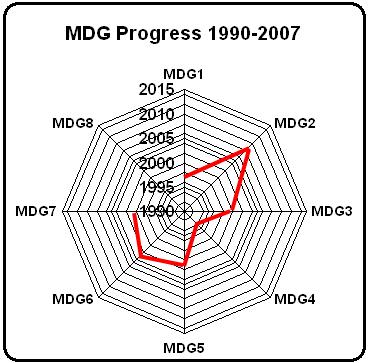
Figure 1 - Status of the Development Millennium Goals as of 2007
Data Source: Millennium Development Goals Report 2007
Figures 2 and 3 provide some insight as to the current stagnation of MDGs. Both are based on the Commitment to Development Index (CDI) formulated at the Center for Global Development. The CDI is an indicator of how committed a rich country is to help the poor countries in seven categories: aid (both quantity and quality), trade, investment, migration, environment, security, and technology. Figure 2 displays the CDI for the environmental category, by country, for 21 countries. Figure 3 shows the CDI for the environmental category, by year, for the same 21 countries. It may seem surprising that the UK and the US rank at the bottom of the list. Given that the US has so much wealth, and produces so much pollution, it should be at the top. Even though we know that achieving the MDGs is not primarily a financial issue, it is disgusting to see the US spending, over $400 trillion dollars in Iraq, yet unwilling to spend 0.7% of the national GNP to support the United Nations.
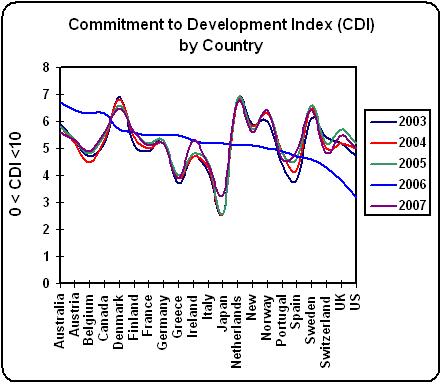
Figure 2 - Commitment to Development Index (Environment Category, by Country)
Data Source: Commitment to Development Index 2007 (Environment, by Country)
Center for Global Development, 2007.
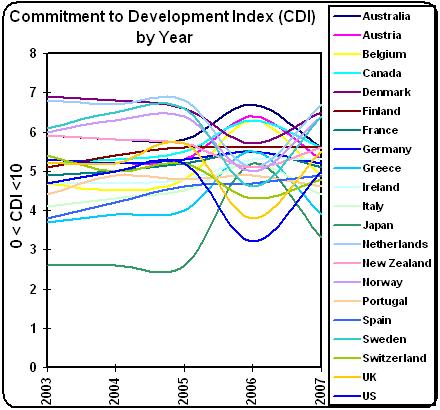
Figure 3 - Commitment to Development Index (Environment Category, by Year)
Data Source: Commitment to Development Index 2007 (Environment, by Year)
Center for Global Development, 2007.
But the important point to be made in connection with Figures 2 and 3 is that, while there are some ups and downs (possibly repercussions of 9/11, the Iraq war, and other events) the trends are generally flat. In the case of the US, they are actually declining, and this in spite of the huge budget deficits that, sooner or later, may trigger a financial crisis in the wealthiest nation on earth. The flatness of the trends means that, at least during the last five years (2003 to 2007), there has been no change in the mentality of the US and the First World nations with regard to the urgency of resolving issues of social and environmental injustice at the global level. Thank God for Al Gore!
To look at the complex "big picture" from which this stagnation emerges, a process assessment model is needed as point of reference. In this regard, it is useful to revisit the general transition model that was proposed in Figure 1 of Volume 1 Number 1 of this newsletter. In fact, based on the research reported in the intervening 30 issues, we can refine the model a bit. The refined model is shown in Figure 4:

|
The emergence of a new ethos of solidarity and non-violence is made possible by the demise of patriarchal-hierarchical systems with absolute power flowing top-down and often abusively
(Fey & Lam, Girard, Lindner, Naranjo, UDHRs, MDGs)
|

|
|
Human development leads to mature freedom of conscience and acting for the common good; this has a mitigating influence on patriarchal [absolute] power and corruption (Bahá'u'lláh,
Fiorenza,
George,
Gospels,
Jung,
Loyola,
Sanford)
|
|
Patriarchal
Mindset
Antidotes:
Egalization
SE Democracy
UGPI & MAPW
|
Solidarity &
Non-Violence
New Ethos:
Break Cycles of
Scapegoating and
Violence-Humiliation
|
|
Human
Development
Inner Limits:
Human Rights
Human Wisdom
Divine Wisdom
|
Sustainable
Development
Outer Limits:
Peace & Justice
Subsidiarity
Technology
|
|
Solidarity induces non-violence, the gateway to sustainable development within the feasible outer limits of the human habitat, as they are gradually enhanced by useful-safe technology (Boulding, Carson, Capra, Forrester, Lovelock, Meadows, GEO4)
|

|
Sustainable development enables resetting priorities and resources to be at the service of the integral development of people, including the expansion of human inner limits to go, beyond knowledge, to wisdom
(Acton, Chardin, Linblom, Laszlo, Maxwell)
|

|
|
Figure 4 - Revision of the SSNV transition process assessment model
NB: This process applies to all human communities and institutions, both secular and religious.
References and Acronyms
Acton, John On absolute power and corruption
Acton, John On authoritarian governance
Bahá'u'lláh, The Works of Bahá'u'lláh
Boulding, Kenneth, The Economics of the Coming Spaceship Earth
Capra, Fritjof, The Hidden Connections: A Science for Sustainable Living
Carson, Rachel, Silent Spring & Other Works
Carson, Rachel, The Story of Silent Spring
Fey, Willard, & Ann Lam, The Ecocosm Paradox
Fiorenza, The Power of the Word: Scripture and the Rhetoric of Empire
Forrester, Jay, Counterintuitive Behavior of Social Systems
George, Cobley, Center for the Study of Democratic Societies
George, Cobley, SeD, Socio-Economic Democracy: An Advanced Socioeconomic System
George, Cobley, MAPW, Maximum Allowable Personal Wealth
George, Cobley, UGPI, Universal Guaranteed Personal Income
Girard, René, Colloquium on Violence and Religion
Girard, René, Girardian Reflections on the Lectionary
Jung, Carl, Analytical Psychology - Reflections on Psychology, Culture, and Life
|
Laszlo, Ervin, Planetary Consciousness: Our next Evolutionary Step
Lindblom, Charles, The Science of Muddling Through
Lindner, Evelin, Human Dignity and Humiliation Studies
Lindner, Evelin, Giving Life to the Human Family - Globalization and Egalization
Lovelock, James, The Revenge of Gaia
Loyola, St. Ignatius, Spiritual Exercises
Maxwell, Nicholas, Can The World Learn Wisdom?
Meadows, Donella et al, Limits to Growth: The 30-Year Update
Naranjo, Claudio, The End of Patriarchy and the Dawning of a Tri-une Society
Naranjo, Claudio, The One Quest: A Map of the Ways of Transformation
Sanford, JohnThe Invisible Partners
Teilhard de Chardin, Pierre, Teilhard de Chardin and the Noosphere
Teilhard de Chardin, Pierre, A Globe, Clothing Itself with a Brain
UN 1948 UDHRs, U.N. Universal Declaration of Human Rights
UN 2000 MDGs, U.N. Millennium Development Goals
UN 2007 GEO4, General Environment Outlook 4
|
In Volume 1 Number 1, this process model was summarized as follows:
"Patriarchy, solidarity, sustainability, and human development are not discrete phases, but rather are the core elements of a feedback loop process. The phases overlap and influence each other. Starting with the patriarchal mindset, and going around the loop clockwise, stronger patriarchal structures induce weaker solidarity, i.e., more reliance on power and domination, and less regard for human rights and the common good. Stronger solidarity induces transition to a sustainability ethos and sustainable human development. The term "sustainable human development" is understood as a shift from extravagant consumption of goods and services in the developed nations to (1) transfer of wealth to allow the developing nations to meet basic human needs, and (2) education, in both developed and developing nations, to motivate growth of the inner human person -- a transition from homo economicus to homo solidarius. This entails more reliance on peaceful negotiation, less extravagant consumption, less pollution, etc. Most important, it entails a more integral development (both outside and inside) of the human person.
"Homo economicus makes decisions so as to maximize personal benefit, regardless of their impact on other persons or social institutions. Homo solidarius makes decisions pursuant to both the satisfaction of legitimate personal needs and the common good of humanity. This is not a naive, utopian ethos. Rather, it derives from the recognition that the quality of life of individuals is never independent of the common good of humanity. Globalization makes this crystal clear, and it is an irreversible process. The 9/11 terrorist attacks were, among other things, a clear signal that the transition from patriarchy to solidarity is indispensable for global peace and human development.
"To the extent that this kind of sustainable human development gains momentum, it tends to mitigate patriarchy -- patriarchal decisions gradually become politically unacceptable once sustainable human development is underway. But the patriarchy to solidarity link is the strongest in the world today, and has been so for millenia; patriarchy reinforces patriarchy ... misogyny reinforces misogyny. We need to pray and work for the globalization of solidarity."
The revised model is structurally identical to the original one, albeit some of the notes have been clarified. It is still composed of four recursive phases:
- The patriarchal mindset phase
The civilized world has been in this phase for at least 10,000 years. The preceding phase is lost in pre-history. We already know that the patriarchal mindset is one of hierarchy and domination. The gradual globalization of patriarchy has not changed its intrinsic nature. But now we understand that patriarchy is leading humanity to self-destruction (Fey & Lam's "ecocosm paradox"). Avoiding such self-destruction will require strong medicine and a radical change in mindset, as Lindner's humiliations studies and Girard's mimetic theory make clear. Else, the best possible scenario is Naranjo's "the end of patriarchy". There are two signs of hope: the UN Universal Declaration of Human rights (1948) and the the UN Millennium Development Goals (2000)
- The solidarity and non-violence phase
The transition from patriarchy to solidarity and non-violence may take a long time. The new ethos should be one that breaks the cycles of scapegoating and humiliation as described by René Girard, Evelin Lindner, Al Gore, and others. This new ethos is a radical departure from the way humanity has behaved since the beginning of human settlements. That humanity has plenty of time for this transition to unfold has been challenged by the best minds, such as Boulding's metaphor of the "spaceship earth", Carson's Silent Spring, and Capra's The Hidden Connections: A Science of Sustainable Living. Another strong reminder was published recently by James Lovestock, The Revenge of Gaia. Other works, such as Forrester's analyses of the counterintuitive behavior of social systems and Meadows' analyses on the outer limits to growth have pointed out the complexity of this transition. Nobody really knows the issues that will emerge and/or the crises that will be created at bifurcation points.
- The sustainable development phase
Solidarity and non-violence are indispensable to achieve sustainable development. In order to proceed from solidarity to sustainability, many human institutions (both secular and religious) will have to be reformed to overcome Acton's dictum: "power corrupts, and absolute power corrupts absolutely". This will be a transition from a materialistic society to a knowledge society, a concept anticipated by Theilhard de Chardin's "Noosphere" ("noosphere" means sphere of knowledge). But there is more. Knowledge without wisdom may lead to all manner of conflicts and a regression from solidarity back to patriarchy. The role of universities will have to change. Universities will have to teach both knowledge and wisdom. For, as Nicholas Maxwel has pointed out, Maxwell's insight that wisdom transcends knowledge and is indispensable to guide the application of knowledge for the benefit of the individual and the common good of humanity. Ervin Laszlo, in The Inner Limits of Mankind, shows convincingly that, while there be outer (material) limits to growth, the are no limits to the inner resources of people; unless people themselves want to create such limits, which happens often enough. This being the case, we must rely on the wisdom of Linblom's science of "muddling through".
- The human development phase
This is the bottom line. This is where the action is .... if we can get there. Some people have always managed to develop themselves to the fullness of their human potential, even to the point where authentic religious (mystical) experience can happen, albeit always as a divine gift. In this regard, the first obstacle to overcome is the lack of solidarity between men and women, a problem that is compounded by phallocentric images of God and patriarchal interpretations of the Judeo-Christian scriptures (see Elisabeth Schussler Fiorenza's The Power of the Word: Scripture and the Rhetoric of Empire). Good resources are certainly available to the person willing to follow the "straight and narrow path" that leads to inner growth: the Christian gospels, a definitive expression of non-violence and liberation from sacrificial and phallocentric religions, and the Spiritual Exercises of St. Ignatius Loyola. Turning East, there are jewels such as the works of Rabindranath Tagore and Bahá'u'lláh's writings on the unity of humanity (Bahá'u'lláh, born in Teheran, Persia, 12 November 1817) is the founder of the Bahá'í Faith. The Bahá'ís believe in the unity of God, the unity of Religion and the unity of Humanity. They also believe in gender equality. Turning back to the West, some recent breakthroughs have been Carl Jung's insight on the animus> and anima abiding in every human being, John Sanford's lucid explanation - in plain English - that there is woman in man and there is man in woman, and Cobley George's heterodox Socio-economic Democracy, which advocates democratically set wealth and poverty limits.
Figure 4 represents a recursive process, i.e., one that may have to go through several cycles before any phase other than patriarchy is sustainably reached. It has been shown that there are methods and tools - some of them developed rather recently - to leave patriarchy behind and converge to a new ethos of solidarity and sustainable development. It will take a long time to go from patriarchy to solidarity, then to sustainable development, and then to sustainable human development. The length of time could be shortened by political will, but there are both outer and inner limits that may induce stagnation and even regression. Trying to expedite, or trying to go too fast may be counterproductive. The analysis shows that the highest priorities are the following:
- Politically, support the MDGs to the maximum possible extent.
- Promoting MDG3 is the most powerful driver to avoid stagnation and make further progress.
- Persist in the slow but indispensable process of paving the way for democratic global governance.
- Promoting MDG8 is the best way to start building a democratic form of global governance.
- Saturate young people with education on solidarity, subsidiarity, and sustainability.
- Get national governments to cancel subsidies to institutions (secular or religious) that perpetuate phallocentric practices.
- Use all peaceful methods to avoid new wars, including global protests, passive resistance, and expulsion from the United Nations.
- Stop wasting human and financial resources.
- Stop trying to drive development from outside. Disband the WB, the IMF, and other similar antiques.
- Start some form of "peace corps" in each member nation - volunteers can be young, old, must have skills to share.
- Then, start working directly with the poor inside each country. Enable them to work and earn a living.
- Peace Corps volunteers can work directly with the poor, train them, and help them find work.
- As they work together, they can transmit the principles of solidarity, sustainability, and non-violence.
- Peace corps volunteers of any given country should be assigned to a mission in another country.
There is no need for billions of dollars to be manipulated financially. There is no need for PRSPs and similar bureaucratic artifacts. The greatest need is for skilled people to work with unskilled people, while at the same time sharing their struggle to overcome structures of injustice and oppression. And this is to be done according to the Mandela model: to both face the truth and practice reconciliation. Always to seek the truth, no matter how painful the truth might be; but never an eye for an eye, never pointing fingers, never actions of revenge. In some cases, it may be necessary to provide peace keepers ("blue helmets") to protect the peace corps. Even if this is the case, it is counterproductive to impose sanctions that will hurt the people more than the elites. Just keep working with the poor, and leave the elites alone. The fact is, elites are not sustainable on their own.
In other words, the kind of balance to be pursued in MDG projects is not the kind of "balance" that results from power struggles, or financial manipulations, or accommodations with elites. The only balance that really matters is to do more good than harm. After seven years, an evidence-based assessment of the MDGs reportedly yields a positive value of good done to people, at least in terms of outer benefits (a complete assessment should include both outer and inner benefits). But if the human habitat is included in the equation, it may well be that the good being done to people is not sustainable. Therefore, a balanced analysis of the MDGs must yield three positives: a positive value of outer good done to people, a positive value of inner good done to people, and a positive value of good done to the human habitat. This will never be accomplished by the patriarchal mentality of wealth accumulation and political domination. It can be accomplished if, and only if, we follow the Mandela model of truth, freedom, care, and reconciliation.
5. If Not the MDGs, Then What?
In striving for sustainable development, humanity can use all the help it can get. This includes both working for human development and managing the human habitat. It is self-evident that the United Nations does not intend the MDGs to become a global monopoly, let alone a global empire. All other initiatives at the local, national, and international levels are welcome to share in the task of building the earth. It is possible to have frictions and misunderstandings when multiple projects coincide in the same place at the same time. If those cannot be resolved, we might as well give up on the future of humanity.
Having said that, let's consider the following points:
- The MDGs are sponsored by the United Nations with the approval of 190+ nations.
- The MDGs are a global project, with national, regional, and local participation.
- The MDGs include both human development and environmental conservation priorities.
- The MDGs are a global instrument of peace, reconciliation, and cross-cultural understanding.
- The MDGs are a global instrument to promote egalization and temper globalization.
- The MDGs provide a real-world classroom and laboratory to learn about global governance.
- The MDGs promote the transition from patriarchy to solidarity and sustainable development.
Is there any other project that has these characteristics? These characteristics are actually requirements, because global issues cannot be resolved at the national level. Is there any other project that meets these requirements?
- Any project that has been endorsed (at least in principle) by 190+ nations, and ....
- is both horizontally global and vertically inclusive of the global, national, regional, and local levels, and ....
- balances care for humanity with care for the human habitat, and ....
- is a global instrument of peace, reconciliation, cross-cultural understanding, and religious tolerance, and ....
- is a global instrument to both promote egalization and temper globalization, and ....
- provides a real-world classroom and laboratory to learn about subsidiarity and all levels of governance, and ....
- promotes the transition from patriarchy to solidarity (including gender equity!), and sustainable human development?
If there is another such program, either operational or in the planning stage, please write a letter to the editor.
6. Current Research on the MDGs
It is reiterated that, regardless of strategic or tactical mistakes, and even regardless of outcome, the world community does not have anything better than the MDGs when it comes to fostering sustainable development. It is also reiterated that, after seven years and midway to the 2015 targets, the overall balance (in terms of both benefit to humanity and benefit to the human habitat) the balance is positive. But the fact that this is a matter of judgment, and the jury is still out, brings to mind another question: what research is being done on the MDGs? By "research" here is meant evidence-based analyses pursuant to increasing the benefits (to humanity and the human habitat) resulting form all the effort and all the resources (financial and otherwise) being consumed by the MDGs.
In addition to research conducted by several organizations within the United Nations, research activity specifically about the MDGs is currently underway in several institutions, and there are many other groups doing research on issues that pertain to the MDGs:
- The State of the Future (SOF), by Jerome C. Glenn and Theodore J. Gordon, is the flagship publication of the Millennium Project. Published annually since 1996 under the auspices of the World Federation of UN Associations (WFUNA), an independent, non-governmental organization with Category One Consultative Status at the Economic and Social Council (ECOSOC) and consultative or liaison links with many other UN organizations and agencies. It is not focused on the MDGs per se, but most of the material is relevant to one or more MDGs. The 2007 SOF report includes updates on 15 global challenges, education & learning projections to 2030, 700 annotated scenario sets, the State of the Future Index (SOFI), and environmental security. The 15 global challenges are:
01. How can sustainable development be achieved for all?
02. How can everyone have sufficient clean water without conflict?
03. How can population growth and resources be brought into balance?
04. How can genuine democracy emerge from authoritarian regimes?
05. How can policymaking be made more sensitive to global long-term perspectives?
06. How can the global convergence of information and communications technologies work for everyone?
07. How can ethical market economies be encouraged to help reduce the gap between rich and poor?
08. How can the threat of new and reemerging diseases and immune micro-organisms be reduced?
09. How can the capacity to decide be improved as the nature of work and institutions change?
10. How can shared values and new security strategies reduce ethnic conflicts, terrorism, and the use of weapons of mass destruction?
11. How can the changing status of women help improve the human condition?
12. How can transnational organized crime networks be stopped from becoming more powerful and sophisticated global enterprises?
13. How can growing energy demands be met safely and efficiently?
14. How can scientific and technological breakthroughs be accelerated to improve the human condition?
15. How can ethical considerations become more routinely incorporated into global decisions?
NB: A review of the 2007 SOF website was provided in the September 2007 issue. An in-depth review of the analyses contained in the 2007 SOF report is in preparation, and hopefully will be part of the December 2007 issue.
- The World Institute for Development Economics Research of the United Nations University
- The Center for Global Development, directed by Dr. Nancy Birdsall, has a research program about the MDGs and has produced several publications:
- The Millennium Project at the Earth Institute, Columbia University, directed by Professor Jeffrey Sachs:
- The World Bank and National Geographic have researched the geography of poverty and the MDGs
- The Overseas Development Institute (ODI, UK), directed by Dr. Simon Maxwell. Research programs: Agriculture, Aid architecture, Asia 2015, Climate change, Fragile states, Gender, Governance and corruption, HIV/AIDs, Human rights, Natural disasters, Social protection, Trade and finance, UN reform, Water
- Center for International Development at Harvard University (CID), directed by Dr. Ricardo Hausmann. Research programs: Growth Lab, Mexico Program, Micro-Development Initiative, Remittances and Migration, Sustainability Science.
- The Initiative on Science and Technology for Sustainability (ISTS), directed by Dr. Shere Abbott. Research programs: Water and Sanitation, Energy, Health and Environment, Agriculture, Biodiversity and Ecosystem Management, Cities. MDG-based development goals: Poverty and Hunger, Education, Gender Equality, Health, Environment,
Global Partnerships. Includes a Forum on Science and Innovation for Sustainable Development (AAAS/ISTS)
- The Energy and Resources Institute, New Delhi, India, directed by Dr. R. K. Pachauri
- The International Sustainable Development Research Society (ISDRS)
- The Centre for Studies in International Development and Economic and Social Movements (Institut CEDIMES), Paris, France,directed by Albagli Claude and Mayoukou Célestin
- The Natural Resources Institute, UK, directed by Dr. Guy Poulter
- The Institute for Global Environmental Strategies (IGES), directed by Prof. Hironori Hamanaka
- The Japan Center for a Sustainable Environment and Society (JACSES), directed by Prof. Koyu Furusawa
- The Prometheus Institute for Sustainable Development, Boston, USA, , directed by Travis Bradford
- International Center for Research on Women (ICRW), Washington DC, directed by Dr. Geeta Rao Gupta
- Ecologic - Institute for International and European Environmental Policy, Germany, directed by R. Andreas Kraemer
- The Oxford Institute for Sustainable Development (OISD)
- the Global Network on Energy for Sustainable Development (GNESD), sponsored by UNEP, with centers in Argentina, Brazil, China, India, Kenya, Lebanon, Senegal, Sierra Leone, South Africa, Thailand, and Tunisia
- TheEnergy Research Institute (ERI), Beijing, China
- Stockholm Environment Institute, Sweden, directed by Johan Rockström and Katarina Eckerberg
The list above is by no means comprehensive. Most national governments have ministries for the environment and/or sustainable development. Most universities have academic and research programs in sustainability. Many think tanks are focusing their priorities on some dimension of sustainable development. Nevertheless, the top minds around the world are still "muddling through" when it comes to formulating sustainable development policies and strategies, especially at the global level.
The abstract of Projecting Progress toward the
Millennium Development Goals, dated August 2007, offers a good synopsis of what is known about the MDGs:
"The Millennium Development Goals have become the frame of reference for most of the development community: the standard by which performance will ultimately be judged. Given their importance, considerable attention has been paid as to whether these goals will be met or not. The overwhelming conclusions from such analyses are not positive. The goals will not be met. There are exceptions—education has expanded rapidly, although questions are raised about quality, and some countries, notably in South East Asia, but also South Asia to a lesser extent, have done well across the board and will meet several of the goals. But many countries, most especially in Africa, will not. The projections show that poverty will become more heavily concentrated in Africa in both relative and absolute terms. In addition, whilst urban poverty will increase, in 2015 poverty will remain a predominately rural phenomenon, with 60-70 per cent of the poor (depending on the measure) living in rural areas. But these projections are based on assumptions, including the assumption of business as usual. Various adverse shocks may result in far worse scenarios. On the other hand, more intensive promotion of pro-poor policies can mean that the goals might yet be realized."
The adoption of more intensive promotion of pro-poor policies, however, is contingent on people undertaking the transition from a patriarchy mindset to a mindset of solidarity, non-violence, and sustainable development. Perhaps most people will need some easy-to-understand incentives to undertake this painful but indispensable transition. The geography of poverty is too complicated. Global warming is too complicated. What about a rapid sequence of cataclysmic natural disasters? Many people still might think that these are "acts of God." What about $100 per gallon of gas at the pump? At least for automobile-addicted Americans, this might do it.
7. Web Resources & Links Database
RECENT CONTENT
General Environment Outlook 4, UNEP, Nairobi, Kenya, 25 October 2007.
From the UNEP GEO4 website: "The fourth Global Environment Outlook: environment for development (GEO-4) assessment is a comprehensive and authoritative UN report on environment, development and human well-being, providing incisive analysis and information for decision making." From the Summary for Decision Makers: "The fourth assessment, Global Environment Outlook: environment for development (GEO-4), is the most comprehensive GEO process to date. It was designed to ensure synergy between science and policy, while
maintaining its scientific credibility and making it responsive to policy needs and objectives. The launch in 2007 of the GEO-4 report coincides with the 20th anniversary of the launch of the report of the World Commission on Environment and Development, Our Common Future. GEO-4 uses it as a reference to assess progress in addressing key environment and development issues. GEO-4 highlights the vital role of the environment in development and, more importantly, for human well-being." [....] "The intertwined environmental and developmental challenges that Our Common Future warned about in 1987 still exist, as do the associated policy challenges. Knowledge of the interlinkages between environment and development, and the impacts on human well-being, gained in the past two decades, can be used effectively for the transition towards sustainable development. Concerns about the global environment may have reached a tipping point
of their own, with the growing realization that for many problems, the benefits of early action outweigh the costs. Now is the time to pursue the transition towards sustainable development supported by well-governed, innovative and results-oriented institutions, which can effectively respond to environmental challenges, particularly persistent ones." Table of Contents:
i. Acknowledgements
ii. Table of Contents
iii. Foreword
iv. Preface
v. Reader's Guide
1. Environment for Development
2. Atmosphere
3. Land
4. Water
5. Biodiversity
6. Sustaining a Common Future
7. Vulnerability of People and the Environment: Challenges and Opportunities
8. Interlinkages: Governance for Sustainability
9. The Future Today - Towards 2015 and Beyond
10. From the Periphery to the Core of Decision Making - Options for Action
| DOWLOAD SUMMARY FROM UNEP | ~
| DOWNLOAD REPORT FROM UNEP |
Poverty in Focus: Does Aid Work for the MDGs? , UNDP International Poverty Centre (IPC), Brasilia, Brazil, October 2007.
From the IPC Publications announcement: "This issue of IPC’s journal Poverty in Focus presents 12 articles summarising some of the most important recent research results and commentaries on the effectiveness of international development cooperation—aid for short—against the background of high-level promises of rapidly increasing aid, including policy conclusions and recommendations for enhancing the impact of aid on the Millennium Development Goals (MDGs)." Featured articles:
Effective Aid Requires New Structures, by Roger Riddell
Target the MDGs—Not Aid Amounts, by Stephen Browne
Do No Harm: Aid and the Missing Middle in Africa, by Nancy Birdsall
Aid Does Work, but Beware of Great Expectations, by Finn Tarp
Aid Allocation and the MDGs, by Edward Anderson
Aid Works Best in Vulnerable Countries, by Patrick Guillaumont
Sectoral Aid Priorities: Missing MDG Targets?, by Rainer Thiele, Peter Nunnenkamp, and Axel Dreher
The IMF and Spending for the MDGs, by David Goldsbrough and Ben Elberger
Aid and Dutch Disease: Nothing to Fear but Fear Itself?, by John Serieux
Use Aid for Investing in the MDGs—Not for Reserves and Debts, by Terry McKinley
Grants versus Loans—Post Debt Crisis Redux, by Pierre Jacquet
We’re working on it: Development Partners’ Efforts for Effective Aid, by Jan Cedetgren
Pew Global Attitudes Report, Pew Research Center, 2007.
From the overview: The publics of the world broadly embrace key tenets of economic globalization but fear the disruptions and downsides of participating in the global economy. In rich countries as well as poor ones, most people endorse free trade, multinational corporations and free markets. However, the latest Pew Global Attitudes survey of more than 45,000 people finds they are concerned about inequality, threats to their culture, threats to the environment and threats posed by immigration. Together, these results reveal an evolving world view on globalization that is nuanced, ambivalent, and sometimes inherently contradictory." Table of contents:
Overview: World Publics Welcome Global Trade – But Not Immigration
About the Project
World Map and Country List
Roadmap to the Report
Chapter 1: Views of Global Change
Chapter 2: Views of Immigration
Chapter 3: Views of Religion and Morality
Chapter 4: Values and American Exceptionalism
Chapter 5: Views on Gender Issues
Chapter 6: Views on Democracy
Chapter 7: Where People Get Their News
Chapter 8: Computers and Technology
Survey Methods
Survey Topline
Science, Technology and Innovation (STI) Indicators in a Changing World: Responding to Policy Needs, OECD, September 2007.
From the website front page: "Policy needs, measurement issues, and some of the challenges in describing cross-cutting and emerging topics in science, technology and innovation (STI) are presented; ideas to exploit existing data and develop new frameworks of measurement are shared. The intent of the debate is to guide future development of STI indicators at the OECD and beyond. As the world interconnects, science, technology and innovation policies cannot be seen as standing alone. There is a growing interest from central banks and Ministries of Finance in improving the understanding of how science, technology and innovation create value in the form of increased productivity and profits, and contribute to the valuation of enterprises, and ultimately stimulate the growth and competitiveness of economies." Browse free on line (read-only pdf). Table of contents (abbreviated):
Chapter 1. STI Indicators: The Context of Change
Chapter 2. The Science of Science and Innovation Policy
Chapter 3. Moving Closer to Evidence-based Policy Analysis
Chapter 4. Impact of Innovation Survey Indicators on Innovation Policy
Chapter 5. Use of Measurements for Capturing Design
Chapter 6. Enriching the Indicator Base for the Economics of Knowledge
Chapter 7. Towards Understanding the Impacts of STI
Chapter 8. User Innovation & Democratizing Innovation
Chapter 9. Quantifying STI Organizational & Marketing Innovation
Chapter 10. University Research in an “Innovation Society”
Chapter 11. The International Mobility of Doctorate Holders
Chapter 12. Biotechnology: From Measures to Impact Indicators
Chapter 13. Measuring the Impacts of Investments in Health Research
Chapter 14. STI for Sustainable Development - Statistical Framework
Chapter 15. Developing STI Indicators: The 21st Century Challenges
Chapter 16. Looking Ahead: Implications for STI Indicator Development
Lighting the Way: Toward a Sustainable Energy Future,
InterAcademy Council, 2007.
From the website: "Commissioned by the governments of Brazil and China, this report identifies a scientific consensus framework for directing global energy development. It lays out the science, technology and policy roadmap for developing energy resources to drive economic growth in both industrialized and developing countries while also securing climate protection and global development goals. The report was produced by a study panel of 15 world-renowned energy experts, co-chaired by Nobel Laureate Steven Chu, Director of the Lawrence Berkeley National Lab in the United States, and José Goldemberg, former Secretary of State for the Environment for the State of São Paulo, Brazil." Free web viewing or PDF download. Table of contents (abbreviated):
Executive Summary
The Sustainable Energy Challenge
Energy Demand and Efficiency
Energy Supply
The Role of Government and the Contribution of Science and Technology
The Case for Immediate Action
1. The Sustainable Energy Challenge
1.1 The scope of the challenge
1.2 The scale of the challenge
1.3 The need for holistic approaches
1.4 Summary points
2. Energy Demand and Efficiency
2.1 Assessing the potential for energy-efficiency improvements
2.2 Barriers to realizing cost-effective energy savings
2.3 The buildings sector
2.4 Industrial energy efficiency
2.5 Transportation energy efficiency
2.6 Summary points
3. Energy Supply
3.1 Fossil fuels
3.2 Nuclear power
3.3 Non-biomass renewables
3.4 Biomass
3.5 Summary points
4. The Role of Government and the Contribution of Science and Technology
4.1 Policy options
4.2 Policy choices in context
4.3 The importance of market signals
4.4 The role of science and technology
4.5 The role of policy and technology in a developing country context
4.6 Summary points
5. The Case for Immediate Action
5.1 Conclusion 1: Meeting the basic energy needs of the poorest people on this planet is a moral and social imperative that can and must be pursued in concert with sustainability objectives.
5.2 Conclusion 2: Concerted efforts must be made to improve energy efficiency and reduce the carbon intensity of the world economy.
5.3 Conclusion 3: Technologies for capturing and sequestering carbon from fossil fuels, particularly coal, can play a major role in the cost-effective management of global carbon dioxide emissions.
5.4 Conclusion 4: Competition for oil and natural gas supplies has the potential to become a source of growing geopolitical tension and economic vulnerability for many nations in the decades ahead.
5.5 Conclusion 5: As a low-carbon resource, nuclear power can continue to make a significant contribution to the world’s energy portfolio in the future, but only if major concerns related to capital cost, safety, and weapons proliferation are addressed.
5.6 Conclusion 6: Renewable energy in its many forms offers immense opportunities for technological progress and innovation
5.7 Conclusion 7: Biofuels hold great promise for simultaneously addressing climate-change and energy-security concerns.
5.8 Conclusion 8: The development of cost-effective energy storage technologies, new energy carriers, and improved transmission infrastructure could substantially reduce costs and expand the contribution from a variety of energy supply options.
5.9 Conclusion 9: The science and technology community—together with the general public—has a critical role to play in advancing sustainable energy solutions and must be effectively engaged.
Lighting the way
Annex A. Study Panel Biographies
Annex B: Acronyms and abbreviations
Annex C: Common energy unit conversion factors and unit prefixes
Annex D: List of boxes, figures, and tables
Worldwide Press Freedom Index 2007, Reporters without Borders, 16 October 2007..
Excerpts from the report: "Eritrea has replaced North Korea in last place in an index measuring the level of press freedom in 169 countries throughout the world that is published today by Reporters Without Borders for the sixth year running.... Outside Europe – in which the top 14 countries are located – no region of the world has been spared censorship or violence towards journalists..... Of the 20 countries at the bottom of the index, seven are Asian (Pakistan, Sri Lanka, Laos, Vietnam, China, Burma, and North Korea), five are African (Ethiopia, Equatorial Guinea, Libya, Somalia and Eritrea), four are in the Middle East (Syria, Iraq, Palestinian Territories and Iran), three are former Soviet republics (Belarus, Uzbekistan and Turkmenistan) and one is in the Americas (Cuba).... Bloggers [are] now threatened as much as journalists in traditional media."
Global Report on Urban Settlements 2007: Enhancing Urban Safety and Security, UN-Habitat , 1 October 2007.
From the website: "As the global population becomes increasingly concentrated in urban areas, the world has witnessed growing threats to urban safety and security. While some of these threats have taken the form of large-scale events such as natural disasters and terrorist attacks, others are the widespread and more common symptoms of physical, economic and social inequalities within the world’s cities. The 2007 Global Report is devoted to three major dimensions of urban safety and security: crime and violence; security of tenure and protection against forced eviction; and natural and human-made disasters. The report focuses on appropriate urban planning and management methods designed to: (i) reduce the incidence and impacts of crime and violence; (ii) reduce the incidence and consequences of tenure insecurity (including forced evictions), with respect to both shelter and informal sector enterprises; and (iii) mitigate the impacts of disasters (both natural and human-made)."
Global Theme Issue on Poverty and Human Development , Council of Science Editors, 22 October 2007..
From the website: "The Council of Science Editors has organized a Global Theme Issue on Poverty and Human Development, in which science journals throughout the world simultaneously publish articles on this topic of worldwide interest on October 22, 2007. The goal of the CSE Global Theme Issue is to stimulate interest and research in poverty and human development and disseminate the results of this research as widely as possible. This is an international collaboration of 235 journals from developed and developing countries.
These 235 journals from 37 countries are publishing more than 750 articles [pertaining to 87 countries] on poverty and human development." Links are provided to all the journals and many of the articles. Please direct any questions or requests for additional information to the attention of Annette Flanagin.
RECENT WEBSITES
Worldwide Governance Indicators 1996-2006, World Bank 2007.
From the home page: "The Worldwide Governance Indicators (WGI) project reports aggregate and individual governance indicators for 212 countries and territories over the period 1996–2006, for six dimensions of governance: Voice and Accountability, Political Stability and Absence of Violence, Government Effectiveness, Regulatory Quality, Rule of Law, Control of Corruption. The aggregate indicators combine the views of a large number of enterprise, citizen and expert survey respondents in industrial and developing countries. The individual data sources underlying the aggregate indicators are drawn from a diverse variety of survey institutes, think tanks, non-governmental organizations, and international organizations." The website is interactive, allowing the user to build charts and maps for any combination of countries and indicators.
Interactive Web-based Platform on Sustainable Agricultural Development,
FAO, 2007.
From the website: "E-Agriculture is an emerging field focusing on the enhancement of agricultural and rural development through improved information and communication processes. More specifically, e-Agriculture involves the conceptualization, design, development, evaluation and application of innovative ways to use information and communication technologies (ICT) in the rural domain, with a primary focus on agriculture. [It] is a global initiative to enhance sustainable agricultural development and food security by improving the use of information, communication, and associated technologies in the sector. The overall aim is to enable members to exchange opinions, experiences, good practices and resources related to e-agriculture, and to ensure that the knowledge created is effectively shared and used worldwide."
Deliver Now for Women + Children, WHO 2007.
From the website: "Deliver Now is a major new advocacy drive to eliminate maternal and child deaths and improve the health of women and children around the world. More than 10 million women and children die every year. The overwhelming majority of these deaths can be prevented with greater access to basic health resources. Deliver Now is coordinated by The Partnership for Maternal, Newborn & Child Health (www.pmnch.org), a global alliance of more than 170 partners. The Partnership is hosted and administered by the World Health Organization, based in Geneva."
Sustainability at the National Academies, National Academies, October 2007..
From the website: "The National Academies have established a Science and Technology for Sustainability Program (STS) in the division of Policy and Global Affairs to encourage the use of science and technology to achieve long term sustainable development - increasing incomes, improving public health, and sustaining critical natural systems. Specific projects under the STS program include the Roundtable on Science and Technology for Sustainability and a workshop series entitled Strengthening Science-Based Decision Making." The website includes sections on
- Sustainability - the Issue
- People & Their Communities
- Life Support Systems: Atmosphere, Water & Food
- Economy & Industry
- Natural Systems
- Institutions & Indicators
- Sustainability, Research & Development
- Sustainable Energy
In each section, links are provided to publications and current projects. For each publication, additional links are provided that allow either free reading online or free PDF downloads.
SSNV LINKS DATABASE UPDATE
The relational database of links to websites with good content on global issues, specifically solidarity, sustainability, and non-violence, is updated as new links are found. Web access to the database is free, and both the EXCEL and HTML versions are free downloads. Please report broken links to the editor.
The knowledge organization model that has been chosen for The Pelican Web and the
Solidarity, Sustainability, and Non-Violence newsletter is a variation of the
Knowledge Map of Chaim Zins. This is work in progress, and will continue to evolve, but the current taxonomies and links organization are shown. The columns are defined as follows: item number, mega-discipline, discipline, specialty, sub-specialty, MDG, and link name/content. The links can be sorted by mega-discipline, discipline, specialty, sub-specialty, and MDG. The version currently shown is sorted by mega-disciplines and then by MDGs.
There is a customized Google search box that may be useful to isolate specific subsets of links. There is also a link to the Harzing tool to retrieve and tabulate citations from the Advanced Google Scholar Search. If anyone has ideas about how to make the database more useful, please contact the editor. Likewise, if anyone is searching for SSNV-related content and needs help, don't hesitate to email the editor with a brief description of the information you need (NB: help is given for free as time permits, but the editor will answer only those requests that are appropriate and SSNV-related).
|
NOTE To download the
SSNV-MDG
links database
excel file,
click HERE.
|
8. Prayer, Study, and Action
Five promises for a better world:
I will do one thing every day to make peace grow like a flower.
I will care for and not destroy the environment.
I will help people hurt by land mines and war
I will solve my arguments peacefully without violence.
Every day I will spend five minutes reflecting peacefully.
Song Kosal, Cambodia, Land mine survivor
Multiple choice quiz (select the best answer):
1. Think locally, act globally
2. Think globally, act locally
3. Think but never act
4. Act without thinking
5. Both 1 and 2, but not 3 and 4
The best answer is ....
9. Links to Archived Newsletters
The following are links to previous issues of the newsletter:
V1 N1 May 2005: Cross-Gender Solidarity
V1 N2 June 2005: The Phallocentric Syndrome
V1 N3 July 2005: From Patriarchy to Solidarity
V1 N4 August 2005: Synthesis of Patriarchy and Solidarity
V1 N5 September 2005: From Solidarity to Sustainability
V1 N6 October 2005: Dimensions of Sustainability
V1 N7 November 2005: Analysis and Synthesis of Objective Evidence
V1 N8 December 2005: Solidarity, Subsidiarity, and Sustainability
V2 N1 January 2006: Synthesis of Solidarity and Sustainability
V2 N2 February 2006: Sustainable Human Development
V2 N3 March 2006: Patriarchy and Mimetic Violence
V2 N4 April 2006: Mimetic Violence in Patriarchal Religions
V2 N5 May 2006: Mimetic Violence in Patriarchal Religions 2
V2 N6 June 2006: Mimetic Violence in Patriarchal Religions 3
V2 N7 July 2006: Mimetic Violence in Patriarchal Religions 4
V2 N8 August 2006: Mimetic Violence in Patriarchal Religions 5
V2 N9 September 2006: Sabbatical Activity ~ September 2006
V2 N10 October 2006: Sabbatical Activity ~ October 2006
V2 N11 November 2006: Sabbatical Activity ~ November 2006
V2 N12 December 2006: Sabbatical Activity ~ December 2006
V3 N01 January 2007: MDG1: Eradicate Extreme Poverty
V3 N02 February 2007: MDG2: Universal Primary Education
V3 N03 March 2007: MDG3: Promotion of Gender Equality
V3 N04 April 2007: MDG4: Reduction of Child Mortality
V3 N05 May 2007: MDG5: Maternal Care Improvement
V3 N06 June 2007: MDG6: Contain the HIV/AIDS Epidemic
V3 N07 July 2007: MDG7: Ensure Environmental Sustainability
V3 N08 August 2007: MDG8: Global Partnership for Development
V3 N09 September 2007: Integrated Analysis of the U.N. MDGs
V3 N10 October 2007: Feasibility of the 2015 MDG Targets
V3 N11 November 2007: If Not the MDGs, Then What?
|Back to SUMMARY|
|Back to OUTLINE|
|Back to SECTION 1|
|Back to SECTION 2|
|Back to SECTION 3|
|Back to SECTION 4|
|Back to SECTION 5|
|Back to SECTION 6|
|Back to SECTION 7|
|Back to SECTION 8|
|Back to SECTION 9|
|Link to Newsletter Home Page|
|Link to Invited Paper|
|
The Pelican Symbol
|
![[pclogo]](pclogo.gif)
The pelican is a legendary symbol of commitment to the service of others, especially those who are weak and most vulnerable to physical and/or psychological violence. See
The Physiologus,
The Symbolism of the Pelican,
Adoro te devote ...,
and a very instructive sermon by Rev. Sylvia Roberts.
Pie Pelicani (Holy Pelican)
The myth is one of a mother pelican who, in order to feed her young, rips a hole in her breast and feeds them of her own flesh and blood. The ancients saw in it a marvelous feminine image of Christ as Mother. Her wings encompass all from Lazarus and Dives to the wedding feast and the bridal couple keyed in the arch as Christ's love shared in the Eucharistic meal embraces us all. Loyola Chapel, Concordia Univ.
![[globengo]](globengo.gif)
A Symbol of Solidarity
![[sustsym03]](sustsymb03.jpg)
A Symbol of Sustainability
![[jcicon]](jcicon.jpg)
A Symbol of Non-Violence
| |
Religious Traditions
![[religions2]](religions2.jpg)
Unity in Diversity
World Religions
|
The following are links to information about some of the major religious traditions and approximate numbers of adherents:
Christianity (2.5 billion)
Islam (1.4 billion)
Hinduism (1 billion)
Buddhism (375 million)
Sikhism (23 million)
Judaism (14 million)
Bahá'í (7 million)
For more information, see World Religions, which includes global maps showing geographic religious distributions.
| |
SSNV Call for Papers
|
This newsletter is now seeking scholars willing to write (pro-bono) short articles about the impacts of all forms of secular and religious violence on human solidarity and ecological sustainability, as well as critical reviews of this work from the perspective of various religious traditions, i.e., Christianity, Buddhism, Judaism, Islam, Hinduism, Sikhism, Bahá'í, etc.
Articles should be 1000 words minimum and 5000 words maximum. Please submit only material that has not been already published elsewhere. The author's CV should be submitted with the paper. The newsletter is published monthly, but there are no specific deadlines. Papers approved by the editor will be included as an "invited paper" when time and space allows.
Email your submission to the editor, Luis T. Gutierrez.
| |
Memorable People
![[Rachel-Carson]](Rachel-Carson.jpg)
Rachel Carson
1907-1964
Rachel Louise Carson was an American marine biologist and nature writer whose writings are often credited with launching the global environmental movement.
List of works:
Under the Sea Wind, 1941
The Sea Around Us, 1951
The Edge of the Sea, 1955
Silent Spring, 1962
The Sense of Wonder, 1965
(published posthumously)
For more information:
Rachel Carson (Wiki Bio)
Life and Legacy of Rachel Carson
Silent Springs Institute
Timeline of Environmental Events
List of Environmental Issues
Environmentalism
Global Citizen
![[algorenobel]](algorenobel.jpg)
Albert Arnold Gore, Jr.
Born in Washington DC, March 31, 1948
United States Senator from Tennessee
45th VP of the United States
(1993 - 2001)
He shares the 2007 Nobel Peace Prize with the UN Intergovernmental Panel on Climate Change
For more information:
2007 Nobel Peace Prize
Albert Arnold Gore, Jr. (Wiki Bio)
UN Panel on Climate Change
Al Gore presidential campaign, 2000
Al Gore Official Website
The Assault on Reason, 2007
An Inconvenient Truth, 2006
Earth in the Balance, 1992
Sign of the Times
![[imgc]](imgc.gif)
Courtesy of Ivelisse Colón Nevárez, OFS
St. Catherine of Siena Institute
The refusal to have women in roles of religious authority perpetuates the image of a patriarchal warrior God, and is therefore an obstacle to human development. This cannot possibly be what God desires.
Hillary for President
![[hillarynovember]](hillarynovember.jpg)
Wife, Mother, Lawyer, Stateswoman
Senator from New York
Next President of the USA
Visit the official website:
Hillary Clinton for President
Want to know more?
Watch the Videos
Bullfrog Films


Bullfrog Films is a leading source of educational videos, with a collection of over 500 titles related to global issues. The reader is invited to visit their Bullfrog Films web site. Each page includes a catalog search box (with search tips). Or, you may prefer to browse the A to Z Titles List, the
List of New Releases, or the List by Subject Area. Regarding issues of global solidarity and sustainability, there are 13 titles about globalization and the UN MDGs, and 27 titles about global efforts to achieve the UN MDGs. Examples:
The UN MDGs: Dream or Reality?
Whose Agenda Is It Anyway?
Killing Poverty
For Richer, For Poorer.
Having had the opportunity to watch these four films, the following review is offered for consideration of the reader. The importance of these films is that they are intended to raise awareness about global issues in young people, and can be used by anyone for this purpose.
The quality of the films is excellent. They are documentaries about the U.N. Millennium Development Goals (MDGs) and include brief interviews with people who are actually involved in MDG programs, from various institutions and from the grassroots to executive level. They are not long (25 to 30 minutes), and the objective evidence about the current global crisis of insecurity, poverty, gender inequities, environmental degradation, and lack of international cooperation is presented in a way that is both realistic and non-inflammatory.
The UN MDGs: Dream or Reality?
This is a very instructive overview of the eight MDGs. It shows the realities that result (at least in part) from social and environmental injustice. Violence is identified as the main obstacle to the MDGs, but it does not show the repulsive ugliness of gender violence and religious violence. These are controversial issues that must be faced. Gender violence is key: 50% of humanity against 50% of humanity. Religious gender violence is the worst, as it is triggered by the delusion that "this is what God desires." At several points, it is claimed that what has to be done, as well as how to do it, is well understood. Do we really? Only God understands how the MDGs and other factors are going to interact over time. What we do know is that political will is indispensable, and still lacking. But the MDGs can be achieved if enough people are willing to (using Lindblom's metaphor) "muddle through" the process.
Whose Agenda Is It Anyway?
This film also excellent and very informative. It focuses on the so-called "Poverty Reduction Strategy Programs" (PRSPs) that the World Bank and other financial institutions use to manage the flow of funds through the governments of developing nations. The film shows the futility of promoting development via financial aid alone. It is also shows that financial policies often end up harming
the poor. This is to be expected, since nobody knows how to anticipate the second and higher order rippling effects of policies formulated by institutions that (for the most part) work in splendid isolation from the poor countries. The film also reminds the viewer that fighting corruption is easier said than done, and suggests that the poor people in rural communities are the ones who really know how to overcome their own poverty. There is a Chinese proverb, "do not give a fish to a hungry man, rather teach him how to fish." Giving him some fishing gear might help if the gear is useful in the waters where he has to fish.
Killing Poverty
This one includes interviews with a wide spectrum of people from government and academia, including Wangari Maathai. She in turn brought to mind Nelson Mandela; it would be great to show, for example, the ending of his inaugural speech of 9 May 1994, when he said: "We place our vision of a new constitutional order for South Africa on the table not as conquerors, prescribing to the conquered. We speak as fellow citizens to heal the wounds of the past with the intent of constructing a new order based on justice for all." The film conveys a very positive message, i.e. a country trying to overcome the problem of corruption in governance by establishing a high level "Anti-Corruption Commission." But the star of the film is the boy who takes care of his sisters while mother is in the hospital; it is good to show that kids can be the best role models for other kids. Another star is the teacher who describes the failures of previous aid programs and concludes that the best thing to do would be to "bring the stuff directly to us."
For Richer, For Poorer
We all know that the rich are getting richer and the poor are getting poorer. We all have seen photos of the "favelas" in Brazil. But the statistic about 50% of the wealth in the hands of 1.1% of the population (assuming 100 persons per "rich family" and 184M total population) is mind-boggling. One positive feature of this film is that is shows the uselessness of pointing fingers with regard to advances in education (or anything else) even as it displays the luxurious life style of the rich in close proximity to the favelas. Another positive is that the concept of solidarity is mentioned, and a concrete example is shown on how solidarity movements can help socially, economically, and politically. The example of a poor man from poor N.E. Brazil reaching the presidency is another plus for this film. Young people today learn early to pay more attention to what people do than to what people say.
Children are the future. Educational materials such as the Bullfrog films are very important for the future of both humanity and the human habitat. There are a number of groups producing films and other materials intended for K-12 students. This is an admirable goal, but this editor wonders if K-12 children (al least here in the USA) can be expected to understand global issues and become motivated to do anything about them. Most American children grow up oblivious to the sub-human living conditions that prevail in the Third World. In a country where there are more registered cars than people with a license to drive them, going to bed hungry at night is something that happens to very few children.
The Bullfrog Films certainly can and should be shown to children, especially to high school students. But these films are most appropriate for those who prepare the children for responsible citizenship, including global citizenship. They are certainly appropriate for parents who want their children to know about the need for human solidarity and environmental sustainability. And, they are most appropriate for training K-12 teachers to plant the seed of global concerns in their students' minds and hearts. Already there are some countries in which the law requires all schools to start this process in Kindergarten. All school boards and school districts in the USA should give prompt consideration to this critical education requirement. Al Gore's Nobel Peace Prize for his work on the climate change issue should be enough to bring the message to all parents and teachers in America.
Any critical comments in this review are meant to be constructive and in no way should be interpreted as questioning the high quality the educational validity of the Bullfrog Films. These films are highly recommended as a way to make people aware about the global issues that must be resolved before it is too late. For more information, please contact:
Bullfrog Films
P.O. Box 149, Oley, PA 19547
Phone: 1.800.543.3764
Fax: 610.370.1978
Email: info@bullfrogfilms.com
Global Education
The following websites offer good materials for global education:

SEE REVIEW


Intute: Comprehensive Web Resources
for Education and Research
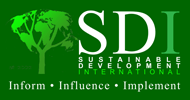


Socioeconomic Democracy
Robley C. George, Director
Center for the Study of Democratic Societies
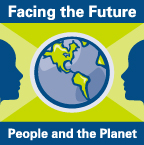
Facing the Future
K12 Education Materials

Library of Congress
Online Catalog Search
Basic Search by Author, Title, Keywords
Guided Search by Index

Library of Congress
Global Gateway to
Electronic Resources Worldwide

MDG Toolkit
United Nations Development Group
Five modules:
1. Millennium Declaration and the MDGs
2. Operationalising the MDGs
3. Monitoring and Reports
4. Advocacy and Campaigning
5. MDG Needs Assessment and Financing Analysis
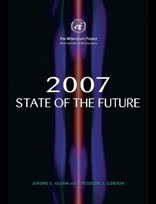
Millennium Project (WFUNA)
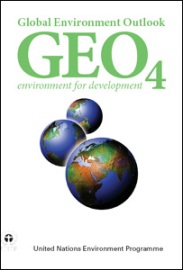
General Environmental Outlook 4
UNEP, 26 October 2007
DOWLOAD SUMMARY FROM UNEP
DOWNLOAD REPORT FROM UNEP
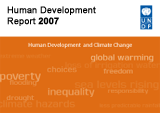
Human Development Report
UNDP, November(?) 2007


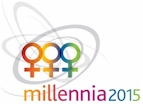


Mimetic Theory of René Girard




Take the quiz!

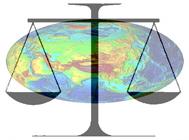
Globalization for the Common Good
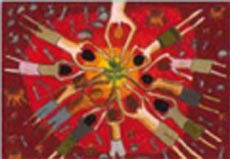
UNEP Gallery of Child Artists
Sirapoom Sirirangsri
Age 10, Thailand
Announcements
and CFPs
HERITAGE 2008
World Heritage and Sustainable Development International Conference, Vila Nova de Foz Côa, Portugal, 8-9 May 2008. In a more globalized world, Heritage should be addressed in innovative and sustainable ways, underlining the role of human and natural heritage as a contra-hegemonic trend. By understanding cultural differences, different peoples may find opportunities to enhance their contribution to a more sustainable world. HERITAGE 2008 aims to gather in an International Conference several worldwide experts on the relationships between Heritage and Human Development, and the Natural Environment and Building Preservation, promoting significant discussion on these relevant topics. The conference is organized with the official support of the Portuguese Ministry of Culture. Point of contact: HERITAGE 2008.
RELIGION, GLOBALIZATION, AND SECURITY
Second Global International Studies Conference, University of Ljubljana, Slovenia, 23-26 July 2008. Topics: political culture and identity, ‘civilisational’ concerns, human security and development, regional conflict studies, transnational religious ideologies, terrorism, political theology. Point of contact: Jeff Haynes.
TECHNOLOGY FOR DEVELOPMENT
Department of International Development (QEH), University of Oxford, 29-30 May 2008. Science and technology play a significant role in economic growth and social development. In what ways can technological capabilities for development purposes best be built up in developing countries? What is the best way of employing technology to address environmental considerations and poverty reduction objectives? What innovation and technology policies should be introduced to reflect the needs of sustainable development? What is the
impact of the rising technological power from the South on the world economy? This conference aims to address these issues with a special focus on the recent emerging economies in the South: Brazil, Russia, India, China and South Africa (BRICS). Comparative studies are particularly welcome. Those wishing to present papers should send extended outlines of about 1000 words to Sanjaya Lall. The deadline for submissions is 15th January 2008. Final copies of accepted papers are required by 15th March 2008.
CLIMATE CHANGE:
SCIENCE AND SOLUTIONS
The National Council for Science and the Environment (NCSE) announces the 8th National Conference on Science, Policy, and the Environment: Climate Change Science and Solutions. January 16-18, Washington DC. "The rising attention and action surrounding climate change solutions is encouraging. Yet we are reminded by respected leaders such as Sir Nicholas Stern that there is an urgent need for swift and large-scale action. Climate change solutions must be concerted, comprehensive, and credible. This conference seeks to develop a robust action agenda for moving forward on this global challenge at all scales, by inviting all stakeholders to the table for an honest and critical look at these key issues." For details contact NCSE Conference 2008 and visit the conference website.
THE BODY AND SOCIAL POLICY
University of Leeds, UK, 15 January 2008. "The body has become a prominent concept within sociology and is becoming a major feature of analysis for those investigating contemporary issues of social exclusion, welfare and policy. This One Day conference aims to foster dialogue between sociological theory and social policy by exploring contemporary debates around issues such as age and ageing, care and care-giving, disability, health and well-being, social capital and social exclusion." Abstract deadline: 30th November 2007. For further information about the conference please contact: Angharad Beckett or Justin Waring.
LONG-TERM POLICIES
GOVERNING SOCIO-ECOLOGICAL CHANGE
The Oldenburg Centre for Sustainability Economics and Management, CENTOS, Oldenburg University, the Environmental Policy Research Centre, Freie Universität Berlin, and its partners are pleased to invite to its 2008 Berlin Conference on the Human Dimensions of Global Environmental Change/ International Conference of the Social-Ecological Research Programme to be held in Berlin on 22 - 23 February 2008. This conference will be the eighth event in the series of annual European Conferences on the Human Dimensions of Global Environmental Change, begun in Berlin in 2001. This year’s conference will address the theme ‘Long-Term Policies: Governing Social-Ecological Change’. Download Call for Papers. Points of contact: conference chair, Bernd Siebenhüner, or conference co-chair, Klaus Jacob
ENVIRONMENTAL WRITERS' CONFERENCE
Boothbay Harbor, Maine, 10-13 June 2008. "The Fifth Environmental Writers' Conference in honor of Rachel Carson will be held once again at The Spruce Point Inn in Boothbay Harbor, Maine, and scholars, writers, educators and artists are welcome to attend. The Conference is held biennially, and it is a blend of scholarly and creative presentations, readings, informal discussions and workshops. In addition, it offers participants an opportunity to enjoy a wide variety of outdoor activities in one of the North Atlantic coastline’s most serene locations where the forest really does meet the sea." For more information, email new-cue or contact the conference website.
PREPARING CITIZENS FOR A
GLOBAL DEMOCRACY
Wolstein Center at Cleveland State University, 29 February 2008. The conference will examine a range of critically important themes of Global Democracy. Speakers will include some of the nation’s leading thinkers in the field of education, as well as 10 workshop presentations by researchers and practitioners. For more information, email the Partnership Conference or visit the conference website.
RELIGION AND THE STATE
The Indiana University Department of Religious Studies announces its annual Graduate Conference, to be held March 20-21, 2008 at Indiana University's Bloomington campus. The topic is “Religion and the State”. The goal of this year’s conference is to explore the harmonies and tensions present in the relationships between religious traditions and the state. We will accept papers dealing with this issue in any historical or geographic context, in theory and/or in practice, and from any disciplinary background. Please send 300-word abstracts and any questions to Diane Fruchtman by 17 December 2007.
LEADERSHIP & MANAGEMENT IN SUB-SAHARAN AFRICA
Accra, Ghana, 7-9 July 2008. Conference paper submissions are being accepted, and information is available at conference website. The keynote speakers will be Prof Stella Nkomo, Bateman Professor of Business Leadership at the University of South Africa, Graduate School of Business Leadership, Pretoria, and Prof Terence Jackson, Business & Management Group, Middlesex University Business School, London.
MANAGING INTERNATIONAL DEVELOPMENT
Special Issue, The Journal of Applied Behavioral Science. We invite submissions to a special issue focused on how organizational development and change (OD&C) is managed in international contexts. Referring to implementation of established change and development models across boundaries and within different cultural contexts, national or geographical settings, and organizations with international, transnational, or multinational memberships, we encourage rich, thick descriptions of how a change process unfolds, how change processes are adapted, how change processes can be evaluated, and how emerging change models can be noted for further development. These descriptions could be supported or underpinned by quantitative data if desired. Please follow JABS guidelines; submit manuscripts by e-mail prior to March 15, 2008, to: Chung-Ming Lau, Jean E. Neumann, Christopher G. Worley.
ICAES 2008
This is the 16th world congress of the International Union of Anthropological and Ethnological Sciences. The theme of the conference is "Humanity, Development, and Cultural Diversity." The conference will take place in Kumming, China, 15-23 July 2008. The points of contact are Prof. Zhang Haiyang and Prof. Zhang Jijiao. Application and registration forms and other information can be obtained from the conference website.
WWWWMM08
Mundos de Mujeres/Women's Worlds 2008 is "the most important congress on
academic research on gender and women and feminist social movements." This major international event will bring together people from all over the world - researchers, specialist, activist and major international public figures to discuss the key issues that impact women. A key goal is to fight against social injustices and gender inequalities. The 2008 interdisciplinary Congress has selected three concepts: frontiers, dares and advancements to address a spectrum of themes and issues that can help us understand the world we live in. Universidad Complutense de Madrid, 3-9 July 2008. Points of contact: Dr. Claudia Malacrida, Dr. Leslie Roman, Conference Secretariat.
SOCIAL SIMULATION CONGRESS
Next year the 2nd World Congress in Social Simulation (WCSS'08) will take place on July 14-16, 2008, at George Mason University, hosted by the Center for Social Complexity, just outside Washington DC. Additional information will follow soon, including the official call for papers, website for early registration, scientific committees, lodging information, and preliminary program. The WCSS series is a joint collaboration of the regional international professional organizations: European Social Simulation Association ESSA; North American Association for Computational Social and Organizational Sciences NAACSOS; and
Pacific Asia Association for Agent Based Social Systems Science PAAA. For more information contact Professor Claudio Cioffi-Revilla, Director of the Center for Social Complexity at George Mason University.
SCIENCE, POLICY, AND ENVIRONMENT
Sponsored by the National Council for Science and the Environment (NCSE). January 16-18, 2008. Washington Convention Center, 801 Mount Vernon Place, N.W., Washington, DC 20001. Focus on Climate Change: Science and Solutions Resources. Please direct questions on NCSE's next conference to NCSE 2008 Conference on Climate Change.
GENDER AND WELL-BEING
A symposium on "Gender and Well Being: The Role of Institutions from Past to Present." Madrid, Spain, 25th-27th June 2008. From the CFP: "There are fundamental questions about the origins and nature of individual and social well-being in Europe, as well as on its sustainability. The symposium's aim to develop a new concept of well-being, examining the socially gendered indicators, actors and processes affecting the production and access to well-being across the life-course. This reflection is meant to be conducted at a crossroads between history, social science and economy." Send abstracts to Paloma de Villota with copy to the Secretary by this Form. Papers must be sent by e-mail no later than 26 May 2008.
BIOLOGY AND RELIGIOUS BEHAVIOR
Call for Papers: "The Biology of Religious Behavior: A Human Ethology Perspective on Religion." Care to spend time in Italy studying psychology and religion? Then consider submitting a paper to the International Society for Human Ethology meeting in Bologna, Italy, July 14-18, 2008. Better yet, there is a possibility for funds to support your travel to Bologna for the conference. Sponsored by the Society of Human Ethology. Bologna, Italy, 14 – 18 July, 2008. The deadline for abstract submission is 1 March 2008. For more information visit the ISHE2008 conference website. Points of contact are Marco Costa, University of Bologna, Italy and Luca Tommasi, University of Chieti, Italy. See also the PsyRel blog of Jay Feierman.
MDG & MEA
Slide Presentations
The Millennium Development Goals (MDG) audio slides, produced by the Earth Institute at Columbia University, provide a basic overview of the MDG program. Prof. Jeffrey D. Sachs, director of The Earth Institute, introduces the MDGs. There are eight sets of slides, one for each MDG. The 2015 targets for each MDG are defined. NB: Adobe Shockwave Player is needed to view these slide presentations. There are many MDG slide presentations available for free downloading, and it is not difficult to google them up. One that is good for young children is the one provided by SlideShare.
The Millennium Ecosystem Assessment (MEA) evaluated the consequences of ecosystem change for human well-being. From 2001 to 2005, the MEA involved the work of more than 1,360 experts worldwide. Their findings provide a state-of-the-art scientific appraisal of the condition and trends in the world’s ecosystems and the services they provide, as well as the scientific basis for action to conserve and use them sustainably. There are several MEA Slide Presentations, in several languages, available for free download.
The MEA also produced a number of reports, maps, graphics, and other resources that may be helpful to educators and researchers.
Site Search
![[fusionbot]](fusionbot.gif)
Downloads
SSNV-MDG
Knowledge Taxonomy
and
Links Directory
The taxonomy and database can be downloaded as either an HTML web page or an excel spreadsheet (the html code is embedded in the excel file for ease of modification).
Download
HTML Web Page
Download
Excel Spreadsheet
Donations
Donations are gratefully accepted.
To donate via PayPal:
To donate via Amazon:

Thank you for helping
to make this work possible.
Tell a Friend:
Solidarity, Sustainability, and Non-Violence Research Project
Visit the Home Page
|
"The earth is but one country,
and mankind its citizens."
Bahá'u'lláh
Persia (now Iran), 1817-1892
|
|
|
Page 1
|
|
| |